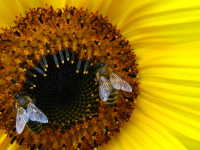‘Bee’ a friend to nature – be a beekeeper.
“I will arise and go now, and go to Innisfree,
And a small cabin build there, of clay and wattles made:
Nine bean-rows will I have there, a hive for the honeybee,
And live alone in the bee-loud glade.” W.B. Yeats “The Lake Isle of Innisfree”
 Recently in Britain 1,000 people showed up to enroll in a single course for novice bee-keepers. People throughout the world know that bees are in trouble after reading about Colony Collapse Disorder and want to do what they can to stop the honey bees’ decline. By 2006 most apiarists were reporting up to one-third of their bees gone or dead. Is it the various mites, pesticides, long distance traveling that wears down our friends? The largest wild blueberry company in Maine called Wyman’s owns 10,000 acres of blueberry terrain and they know that their 125 year old business is finished if a solution is not found soon. They have given a large grant to scientists to try and find out what needs to be done. Citizen science is also coming forward and helping biologists to understand the problem. Gretchen LeBuhn started the Great Sunflower Project- see www.sunflower.org- to try to have a better knowledge of what bees were up to across Canada and the U.S. She has over 60,000 volunteers who plant a sunflower in their yard, watch for all sorts of bees and then send in their data. It’s a wonderful way to encourage young people to become naturalists and know how important all kinds of bees are for pollination.
Recently in Britain 1,000 people showed up to enroll in a single course for novice bee-keepers. People throughout the world know that bees are in trouble after reading about Colony Collapse Disorder and want to do what they can to stop the honey bees’ decline. By 2006 most apiarists were reporting up to one-third of their bees gone or dead. Is it the various mites, pesticides, long distance traveling that wears down our friends? The largest wild blueberry company in Maine called Wyman’s owns 10,000 acres of blueberry terrain and they know that their 125 year old business is finished if a solution is not found soon. They have given a large grant to scientists to try and find out what needs to be done. Citizen science is also coming forward and helping biologists to understand the problem. Gretchen LeBuhn started the Great Sunflower Project- see www.sunflower.org- to try to have a better knowledge of what bees were up to across Canada and the U.S. She has over 60,000 volunteers who plant a sunflower in their yard, watch for all sorts of bees and then send in their data. It’s a wonderful way to encourage young people to become naturalists and know how important all kinds of bees are for pollination.
After 22 years of keeping bees I can understand why men and women want this ultimate nature hobby. What is so unique about bee-keeping is the egalitarian interaction with another species. The European honey bee, Apis mellifera, is an equal in its relationship with humans. If a bee-keeper does not treat his bees with due respect, or if their lodging is not to their satisfaction, they may just fly away. Good beekeepers are careful to leave enough honey in the hive so the bees survive the winter. Pragmatism and outright admiration for these insect’s social order creates the perfect partnership.
We have all heard of the bee dances that communicate information to the colony. Observing bees enter their colony is an inspiring experience. For example, watch how bees use ‘air-conditioning’ to cool down the hive by using their wings to fan the hot air out of the colony on a scorching summer day. In the fall a person can see the sad exit of perhaps ninety-five percent of the drones (male bees) being shoved out of the colony so the workers and the queen have enough honey for the winter. Catching a swarm is always an adventure. Swarming bees are looking for a new place to live, and swarms of thousands of bees announce themselves with a huge buzz as they cling to a branch. Bees are very safe to work with when they are swarming. If you see a swarm, call a bee-keeper and they will be happy to come by and catch it. Never spray the honey bees with an insecticide. Most people know how important bees are for our local apple industry and vegetable gardens. Fifteen billion dollars of added crops can be directly related to pollination by bees in North America.
There is no bylaw against having bees in the Town of Collingwood. Our bees, in the Beaver Valley, are twenty feet from our house and no one has ever been stung as a result of the hives’ proximity to the house. It would be a good idea to have a fence around the bees or a fenced- in backyard if you live in town. Young people can learn so much by sitting quietly next to the colony and observing all the wonderful activity taking place. Children love extracting honey too. Once the fields of goldenrod have finished in the fall, it is a true celebration tasting the honey and honouring the bees’ work by making sure they have a cozy hive for the winter.

